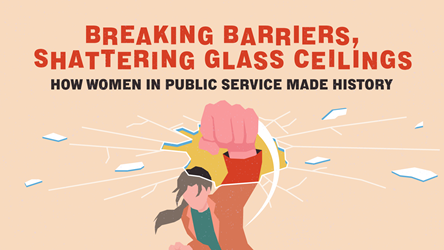The Unseen Battle: How Public Officers Tackle Mental Health Challenges
Here’s how our public officers are supported to tackle mental health challenges.
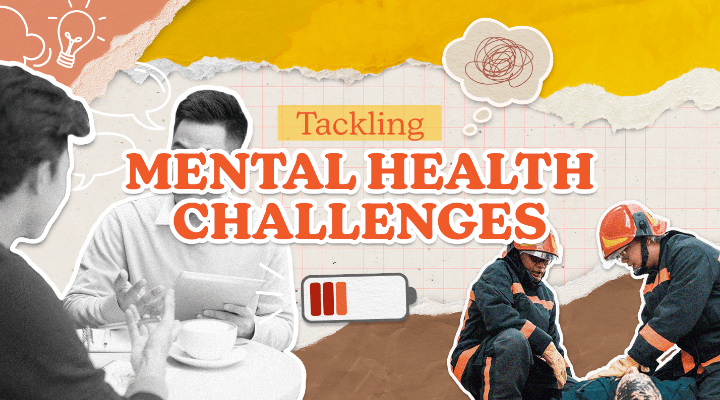
When asked if he could share an incident that challenged him emotionally and mentally, LTA Uriah Sim from the Singapore Civil Defence Force (SCDF) recounted his experience responding to a fire three years ago.
Unfortunately, this mission resulted in a heartbreaking outcome as one of the two victims they rescued tragically succumbed despite the team administering CPR.
“The loss of life, despite our best efforts, stirs up feelings of sorrow, guilt, and helplessness. It was natural to question if there were alternative actions we could have taken,” recounted LTA Sim.
In this article, Challenge takes a deep dive into some of our public officers' unseen mental health challenges and how a positive work environment helps.
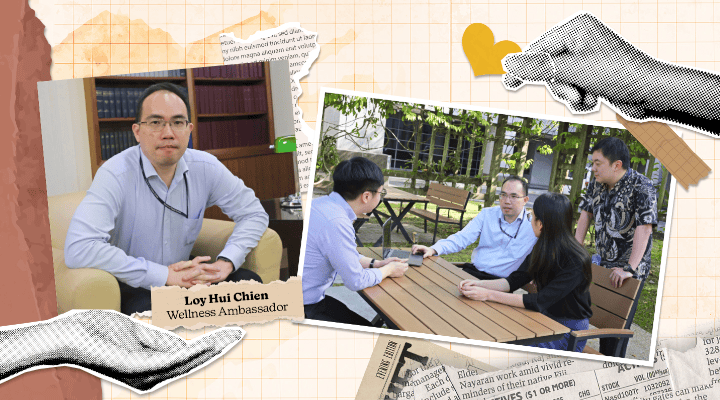
"Brownout" - The Stage Before Burnout
Burnout is one of the mental health challenges non-frontline public officers face, according to Loy Hui Chien, a director-general at the Ministry of Foreign Affairs (MFA) and a wellness ambassador. In his interview with Challenge, he shared the concept of "brownout", the stage before burnout.
"If "burnout" is the flu, then "brownout" is like the common cold," explained Hui Chien. Brownout can sometimes be indicated by emotional exhaustion, reduced productivity, and impaired performance.
Hui Chien also shared that while our work as public officers is meaningful and deeply rewarding, it can get overwhelming at times.
He also added that public officers need to recognise when they need to step back and prioritise their well-being.
"Many dedicated public officers frequently push themselves to the limits. While someone may appear okay and not in an obvious crisis, it's important to take proactive and preventive measures before things reach a tipping point," he emphasised.
Hui Chien shared that he experienced burnout during the COVID-19 pandemic, which taught him the importance of emotional well-being and its impact on his overall health. Overcoming the emotional hurdle led him to become a wellness ambassador at MFA, as he hoped to support fellow public officers in their mental health journeys.
The Pressures of Ensuring Singaporeans’ Safety
On the other hand, frontline public officers experience a slightly different set of mental health challenges. As a Rota Commander at the SCDF, LTA Uriah Sim had his fair share of stressful experiences that could be mentally and emotionally taxing.
He shared that attending to emergencies means that frontliners are often exposed to traumatic experiences and have to interact with distressed individuals. Over time, this takes a toll on their mental well-being.
Consistent exposure to traumatic events can sometimes lead to increased levels of stress, anxiety and depression, if not dealt with properly. In more severe cases, frontline officers might experience emotional or psychological stress after attending to notable incidents.
The Power of Opening Up
For the SCDF frontliners, being open with one another allows them to process their emotions and relieve themselves from the overwhelming stress.
LTA Sim shared that he had to grapple with many complex emotions after tending to emergencies and actively sought support and comfort from his fellow firefighters.
"Personally, I found solace in debriefing with my team, where we have open discussions to facilitate mutual support and gain valuable insights into the events," said LTA Sim.
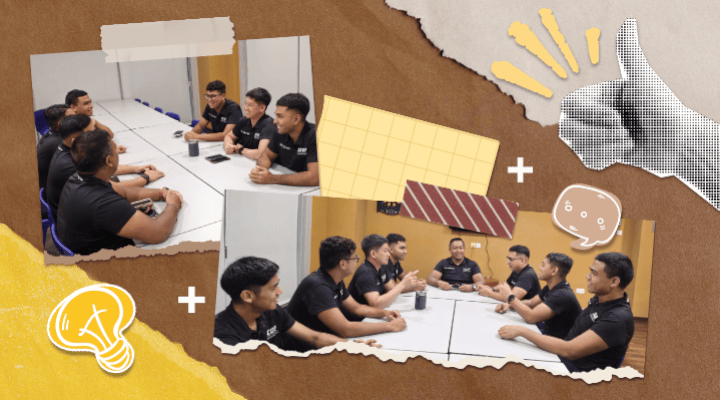
These debrief sessions also foster camaraderie, helping to build unique connections within each team.
Referencing psychotherapist Amy Morin's book "13 Things Mentally Strong People Don't Do", Hui Chien stresses the importance of opening up to proactively manage everyday thoughts and emotions, and how that strengthens mental resilience.
“Mental strength isn’t about acting tough or avoiding emotional pain. It is about empowering ourselves to handle life’s difficulties in a way that allows us to continue to grow.”
- Loy Hui Chien, Director-General (Southeast Asia II), MFA
Seeking High-Quality Psychological Care
Khairiyah Kassim, a lead psychologist with the SCDF, explains that some officers go through a compartmentalisation process to help regulate their emotions and allow them to focus on the task at hand.
For frontliners, the concept of life and death is no longer abstract, as their responsibility is to care for the lives of others. "That ability to accept life and death, it's something that our frontliners need to have especially when the situation is beyond their control, " added Khairiyah.
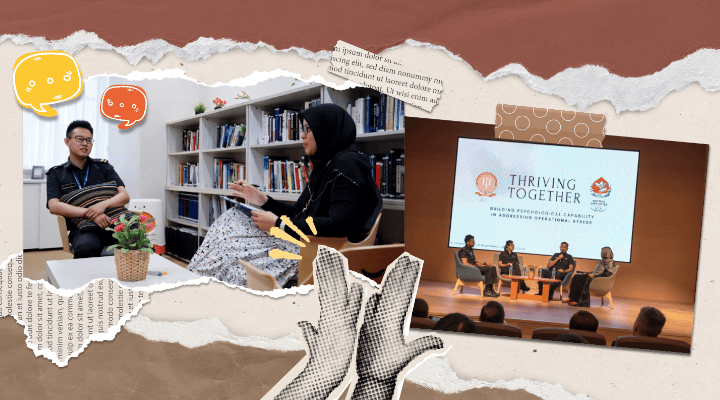
As a psychologist, Khairiyah acknowledged that Singapore has become more open and receptive to conversations regarding mental health issues, both in and out of work. As a result, many have become more self-aware of having healthy and helpful thoughts, emotions and behaviours to lead a fulfilling life.
However, she also pointed out the dangers of self-diagnosing from limited knowledge when faced with life’s challenges – which can lead to misdiagnosis and cause one to go down an unhelpful downward spiral and pigeonhole oneself.
To help debunk mental health myths, SCDF launched an online Mental Health Literacy Programme to equip frontliners with knowledge on mental health issues and skills to engage in healthy conversations.
The SCDF para-counsellor scheme is another longtime initiative that aims to be a self-sustaining model for frontliners to seek peer support on the ground and also serves as the “eyes and ears” for in-house psychologists like Khairiyah.
“Para counsellors give us feedback on what’s happening on the ground and what needs to be done at a strategic level,” she explained.
SCDF frontliners are also provided with a 24/7 helpline, counselling services, and critical incident stress management programmes, where they can seek professional help and psychological first aid when needed.
For non-frontline public officers, the Public Service Division (PSD) started the Wellness Ambassador movement, where over 2,000 Wellness Ambassadors across public agencies are trained to provide essential mental and emotional support for their colleagues.
Under the new Well-being@Gov programme, public officers can receive personalised resources as well as 1-to-1 coaching on a wide range of issues, including their work, stress, relationships, and health. For those who need a safe space to talk, counselling services are available through the whole-of-government counselling hotline.
Know Your Purpose
When asked for advice she gives to frontline officers, Khairiyah shared that apart from sharing stress management techniques, she also guides them to set goals to re-establish their sense of purpose.
“Knowing what you are in for, and what your goal and purpose are as you don the uniform in a frontline setting – that, to me, is very important.”
- Khairiyah Kassim, Lead Psychologist, SCDF
She also talks about the effectiveness of attention control, explaining that it helps the frontline officers redirect their focus onto the task at hand.
Khairiyah added that apart from setting up policies and frameworks that facilitate safe environments, establishing a close-knit team culture is also essential, and it is something that “policies can’t capture 100%”.
Gone are the days when being emotionally vulnerable is a sign of weakness.
Instead, it is a display of courage.

Want to get more stories like this? Join our Telegram channel: https://t.me/psdchallenge.
- POSTED ON
Apr 19, 2024
- TEXT BY
Jayme Teo
- PHOTOS BY
Yim Sun Young
Jasmine Lim





